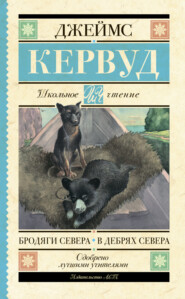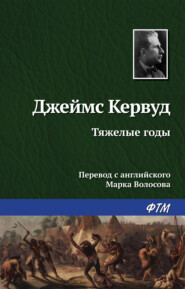По всем вопросам обращайтесь на: info@litportal.ru
(©) 2003-2024.
✖
The Valley of Silent Men
Автор
Год написания книги
2017
Настройки чтения
Размер шрифта
Высота строк
Поля
Kent winced. "In a large, embracing sense, yes," he said. "I believe in Him, for instance, as revealed to our senses in all that living, growing glory you see out there through the window Nature and I have become pretty good pals, and you see I've sort of built up a mother goddess to worship instead of a he-god. Sacrilege, maybe, but it's a great comfort at times. But you didn't come to talk religion?"
The lovely head bent still nearer him. He felt an impelling desire to put up his hand and touch her shining hair, as she laid her hand on his forehead.
"I know who killed John Barkley," she insisted. "I know how and when and why he was killed. Please tell me the truth. I want to know. Why did you confess to a crime which you did not commit?"
Kent took time to light his cigar. The girl watched him closely, almost eagerly.
"I may be mad," he said. "It is possible for any human being to be mad and not know it. That's the funny part about insanity. But if I'm not insane, I killed Barkley; if I didn't kill him, I must be insane, for I'm very well convinced that I did. Either that, or you are insane. I have my suspicions that you are. Would a sane person wear pumps with heels like those up here?" He pointed accusingly to the floor.
For the first time the girl smiled, openly, frankly, gloriously. It was as if her heart had leaped forth for an instant and had greeted him. And then, like sunlight shadowed by cloud, the smile was gone. "You are a brave man," she said. "You are splendid. I hate men. But I think if you lived very long, I should love you. I will believe that you killed Barkley. You compel me to believe it. You confessed, when you found you were going to die, that an innocent man might be saved. Wasn't that it?"
Kent nodded weakly. "That's it. I hate to think of it that way, but I guess it's true. I confessed because I knew I was going to die. Otherwise I am quite sure that I should have let the other fellow take my medicine for me. You must think I am a beast."
"All men are beasts," she agreed quickly. "But you are – a different kind of beast. I like you. If there were a chance, I might fight for you. I can fight." She held up her two small hands, half smiling at him again.
"But not with those," he exclaimed. "I think you would fight with your eyes. O'Connor told me they half killed Kedsty when you met them in the poplar grove yesterday."
He had expected that the mention of Inspector Kedsty's name would disturb her. It had no effect that he could perceive.
"O'Connor was the big, red-faced man with Mr. Kedsty?"
"Yes, my trail partner. He came to me yesterday and raved about your eyes. They ARE beautiful; I've never seen eyes half so lovely. But that wasn't what struck Bucky so hard. It was the effect they had on Kedsty. He said they shattered every nerve in Kedsty's body, and Kedsty isn't the sort to get easily frightened. And the queer part of it was that the instant you had gone, he gave O'Connor an order to free McTrigger – and then turned and followed you. All the rest of that day O'Connor tried to discover something about you at the Landing. He couldn't find hide nor hair – I beg pardon! – I mean he couldn't find out anything about you at all. We made up our minds that for some reason or other you were hiding up at Kedsty's bungalow. You don't mind a fellow saying all this – when he is going to pop off soon – do you?"
He was half frightened at the directness with which he had expressed the thing. He would gladly have buried his own curiosity and all of O'Connor's suspicions for another moment of her hand on his forehead. But it was out, and he waited.
She was looking down, her fingers twisting some sort of tasseled dress ornament in her lap, and Kent mentally measured the length of her lashes with a foot rule in mind. They were superb, and in the thrill of his admiration he would have sworn they were an inch long. She looked up suddenly and caught the glow in his eyes and the flush that lay under the tan of his cheeks. Her own color had deepened a little.
"What if you shouldn't die?" she asked him bluntly, as if she had not heard a word of all he had said about Kedsty. "What would you do?"
"I'm going to."
"But if you shouldn't?"
Kent shrugged his shoulders. "I suppose I'd have to take my medicine. You're not going?"
She had straightened up and was sitting on the edge of her chair. "Yes, I'm going. I'm afraid of my eyes. I may look at you as I looked at Mr. Kedsty, and then – pop you'd go, quick! And I don't want to be here when you die!"
He heard a soft little note of laughter in her throat. It sent a chill through him. What an adorable, blood-thirsty little wretch she was! He stared at her bent head, at the shining coils of her wonderful hair. Undone, he could see it completely hiding her. And it was so soft and warm that again he was tempted to reach out and touch it. She was wonderful, and yet it was not possible that she had a heart. Her apparent disregard of the fact that he was a dying man was almost diabolic. There was no sympathy in the expression of her violet eyes as she looked at him. She was even making fun of the fact that he was about to die!
She stood up, surveying for the first time the room in which she had been sitting. Then she turned to the window and looked out. She reminded Kent of a beautiful young willow that had grown at the edge of a stream, exquisite, slender, strong. He could have picked her up in his arms as easily as a child, yet he sensed in the lithe beauty of her body forces that could endure magnificently. The careless poise of her head fascinated him. For that head and the hair that crowned it he knew that half the women of the earth would have traded precious years of their lives.
And then, without turning toward him, she said, "Some day, when I die, I wish I might have as pleasant a room as this."
"I hope you never die," he replied devoutly.
She came back and stood for a moment beside him.
"I have had a very pleasant time," she said, as though he had given her a special sort of entertainment. "It's too bad you are going to die. I'm sure we should have been good friends. Aren't you?"
"Yes, very sure. If you had only arrived sooner – "
"And I shall always think of you as a different kind of man-beast," she interrupted him. "It is really true that I shouldn't like to see you die. I want to get away before it happens. Would you care to have me kiss you?"
For an instant Kent felt that his aorta was about to give away. "I – I would," he gasped huskily.
"Then – close your eyes, please."
He obeyed. She bent over him. He felt the soft touch of her hands and caught for an instant the perfume of her face and hair, and then the thrill of her lips pressed warm and soft upon his.
She was not flushed or embarrassed when he looked at her again. It was as if she had kissed a baby and was wondering at its red face. "I've only kissed three men before you," she avowed. "It is strange. I never thought I should do it again. And now, good-by!" She moved quickly to the door.
"Wait," he cried plaintively. "Please wait. I want to know your name. It is Marette – "
"Radisson," she finished for him. "Marette Radisson, and I come from away off there, from a place we call the Valley of Silent Men." She was pointing into the north.
"The North!" he exclaimed.
"Yes, it is far north. Very far."
Her hand was on the latch. The door opened slowly.
"Wait," he pleaded again. "You must not go."
"Yes, I must go. I have remained too long. I am sorry I kissed you. I shouldn't have done that. But I had to because you are such a splendid liar!"
The door opened quickly and closed behind her. He heard her steps almost running down the hall, where not long ago he had listened to the last of O'Connor's.
And then there was silence, and in that silence he heard her words again, drumming like little hammers in his head, Because you are such a splendid liar!"
CHAPTER VI
James Kent, among his other qualities good and bad, possessed a merciless opinion of his own shortcomings, but never, in that opinion, had he fallen so low as in the interval which immediately followed the closing of his door behind the mysterious girl who had told him that her name was Marette Radisson. No sooner was she gone than the overwhelming superiority of her childlike cleverness smote him until, ashamed of himself, he burned red in his aloneness.
He, Sergeant Kent, the coolest man on the force next to Inspector Kedsty, the most dreaded of catechists when questioning criminals, the man who had won the reputation of facing quietly and with deadly sureness the most menacing of dangers, had been beaten – horribly beaten – by a girl! And yet, in defeat, an irrepressible and at times distorted sense of humor made him give credit to the victor. The shame of the thing was his acknowledgment that a bit of feminine beauty had done the trick. He had made fun of O'Connor when the big staff-sergeant had described the effect of the girl's eyes on Inspector Kedsty. And, now, if O'Connor could know of what had happened here —
And then, like a rubber ball, that saving sense of humor bounced up out of the mess, and Kent found himself chuckling as his face grew cooler. His visitor had come, and she had gone, and he knew no more about her than when she had entered his room, except that her very pretty name was Marette Radisson. He was just beginning to think of the questions he had wanted to ask, a dozen, half a hundred of them – more definitely who she was; how and why she had come to Athabasca Landing; her interest in Sandy McTrigger; the mysterious relationship that must surely exist between her and Inspector Kedsty; and, chiefly, her real motive in coming to him when she knew that he was dying. He comforted himself by the assurance that he would have learned these things had she not left him so suddenly. He had not expected that.
The question which seated itself most insistently in his mind was, why had she come? Was it, after all, merely a matter of curiosity? Was her relationship to Sandy McTrigger such that inquisitiveness alone had brought her to see the man who had saved him? Surely she had not been urged by a sense of gratitude, for in no way had she given expression to that. On his death-bed she had almost made fun of him. And she could not have come as a messenger from McTrigger, or she would have left her message. For the first time he began to doubt that she knew the man at all, in spite of the strange thing that had happened under O'Connor's eyes. But she must know Kedsty. She had made no answer to his half-accusation that she was hiding up at the Inspector's bungalow. He had used that word – "hiding." It should have had an effect. And she was as beautifully unconscious of it as though she had not heard him, and he knew that she had heard him very distinctly. It was then that she had given him that splendid view of her amazingly long lashes and had countered softly,
"What if you shouldn't die?"
Kent felt himself suddenly aglow with an irresistible appreciation of the genius of her subtlety, and with that appreciation came a thrill of deeper understanding. He believed that he knew why she had left him so suddenly. It was because she had seen herself close to the danger-line. There were things which she did not want him to know or question her about, and his daring intimation that she was hiding in Kedsty's bungalow had warned her. Was it possible that Kedsty himself had sent her for some reason which he could not even guess at? Positively it was not because of McTrigger, the man he had saved. At least she would have thanked him in some way. She would not have appeared quite so adorably cold-blooded, quite so sweetly unconscious of the fact that he was dying. If McTrigger's freedom had meant anything to her, she could not have done less than reveal to him a bit of sympathy. And her greatest compliment, if he excepted the kiss, was that she had called him a splendid liar!
Kent grimaced and drew in a deep breath because of the tightness in his chest. Why was it that every one seemed to disbelieve him? Why was it that even this mysterious girl, whom he had never seen before in his life, politely called him a liar when he insisted that he had killed John Barkley? Was the fact of murder necessarily branded in one's face? If so, he had never observed it. Some of the hardest criminals he had brought in from the down-river country were likable-looking men. There was Horrigan, for instance, who for seven long weeks kept him in good humor with his drollery, though he was bringing him in to be hanged. And there were McTab, and le Bête Noir– the Black Beast – a lovable vagabond in spite of his record, and Le Beau, the gentlemanly robber of the wilderness mail, and half a dozen others he could recall without any effort at all. No one called them liars when, like real men, they confessed their crimes when they saw their game was up. To a man they had given up the ghost with their boots on, and Kent respected their memory because of it. And he was dying – and even this stranger girl called him a liar? And no case had ever been more complete than his own. He had gone mercilessly into the condemning detail of it all. It was down in black and white. He had signed it. And still he was disbelieved. It was funny, deuced funny, thought Kent.
Until young Mercer opened the door and came in with his late breakfast, he had forgotten that he had really been hungry when he awakened with Cardigan's stethoscope at his chest. Mercer had amused him from the first. The pink-faced young Englishman, fresh from the old country, could not conceal in his face and attitude the fact that he was walking in the presence of the gallows whenever he entered the room. He was, as he had confided in Cardigan, "beastly hit up" over the thing. To feed and wash a man who would undoubtedly die, but who would be hanged by the neck until he was dead if he lived, filled him with peculiar and at times conspicuous emotions. It was like attending to a living corpse, if such a thing could be conceived. And Mercer had conceived it. Kent had come to regard him as more or less of a barometer giving away Cardigan's secrets. He had not told Cardigan, but had kept the discovery for his own amusement.
This morning Mercer's face was less pink, and his pale eyes were paler, Kent thought. Also he started to sprinkle sugar on his eggs in place of salt.

















